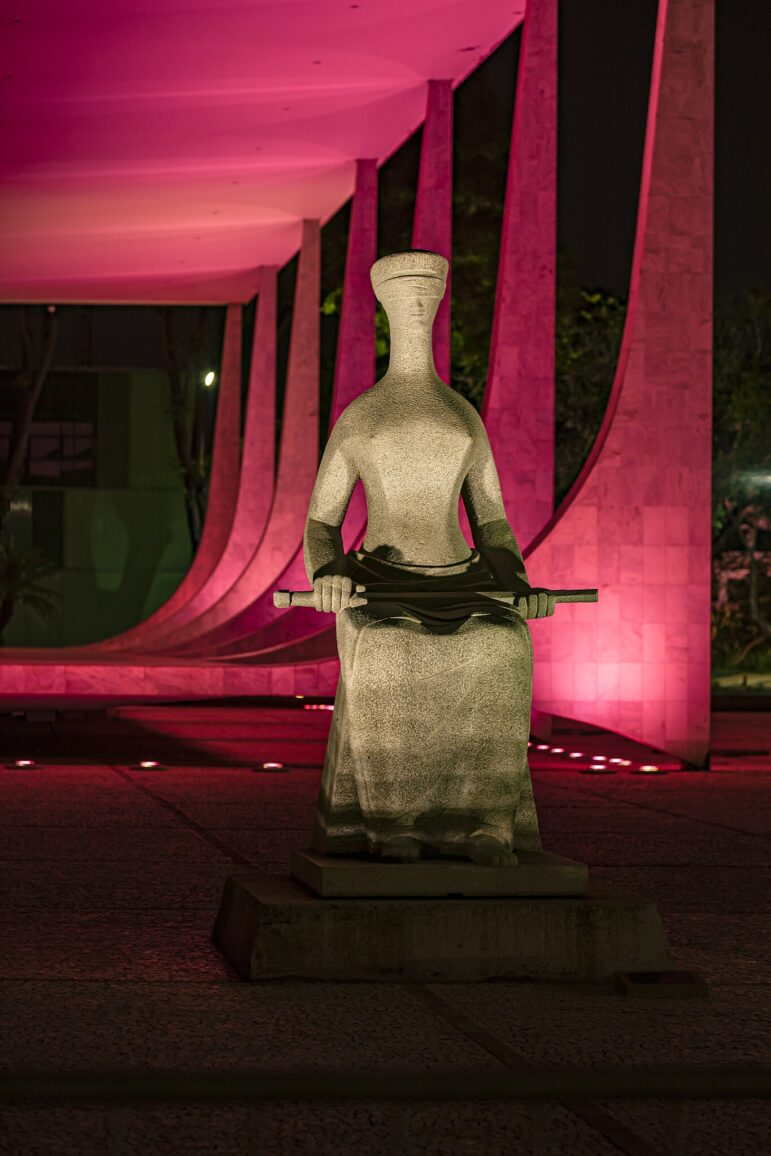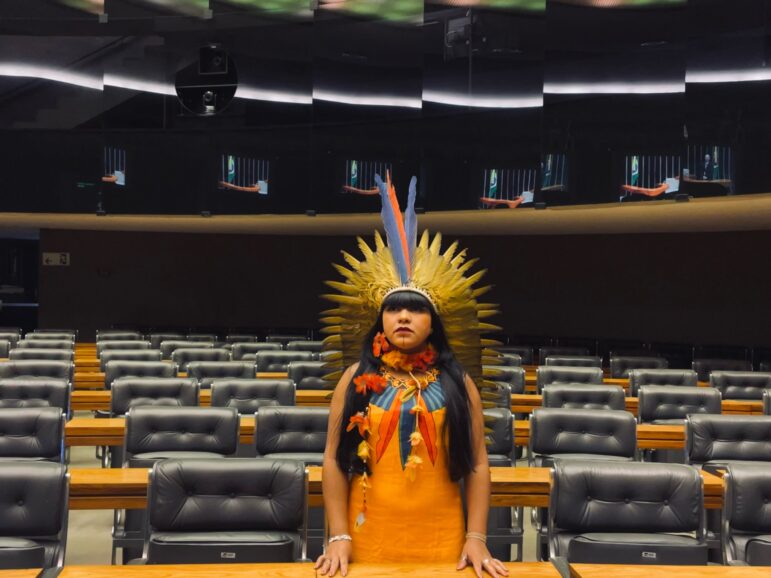São Paulo – In 2021, The Wild Hunt reported that Brazil’s Supreme Court had overturned arguments by agribusiness that claimed Indigenous peoples could not claim land they were not occupying before Brazil’s current constitution came into effect in 1988. This ruling is based on the “Marco Temporal”, or timeline mark, and favored the Xokleng People’s claim to land they acquired after being displaced from ancestral lands in the 1950s by tobacco farmers.
In September of that year, Brazil’s Supreme Court Justice Edson Fachin rejected the thesis that 1988 represents a historical timeline limit and reaffirmed that Indigenous rights cannot be changed. “Indigenous territorial rights consist of a fundamental right of Indigenous peoples and are materialized in the original right over the lands they traditionally occupy,” Fachin said.

Justice Statue at the Supreme Federal Court in Brazil [Photo Credit: Dasfour2022 CCA-SA 4.0]
Despite the court ruling, many felt the issue would remain unresolved without further legislation. Their suspicions have been validated as anti-Indigenous groups have been mobilizing to block legislative implementation of a new constitutional amendment reopening the Supreme Court decision.
On Wednesday, July 15, the Federal Senate appraised a proposed constitutional amendment, PEC 48, during the session of the Constitution, Justice, and Citizenship Committee (CCJ). The amendment threatens Indigenous territories in Brazil by imposing a time frame on land demarcations thus reopening the previous Supreme Court decisions. Indigenous communities have referred to the amendment as the “PEC of Death.”
This controversial amendment, introduced in December and pushed by the agribusiness caucus and far-right factions, could lead to increased deforestation and loss of vital ecosystems. The proposed constitutional amendment rewrites the constitution and reconsiders the Marco Temporal, outmaneuvering the previous Supreme Court opinion.
The amendment marks a significant escalation in agribusiness’s attempts to undermine the constitutional and legal protections of Indigenous rights. The language of the amendment authorizes, for example, the planting of GMO crops in Indigenous territories and permits the construction of energy and other infrastructure projects within these areas without consulting or obtaining consent from Indigenous peoples. The bill empowers the government to reclaim demarcated Indigenous lands by asserting that Indigenous groups no longer adhere to their traditional customs, among other concerning provisions.
Congresswoman and Indigenous educator, Célia Xakriabá, called for the amendment to be annulled immediately citing the previous Supreme Court ruling.

Célia Xakriabá via X (formerly Twitter)
The Articulation of Indigenous Peoples of Brazil (APIB) a grassroots Indigenous movement protecting Indigenous rights, wrote “The thesis also ignores the violence and persecutions that Indigenous peoples have faced for over 500 years, especially during the military dictatorship, which prevented many peoples from being in their territories on that exact date in 1988″.
In a statement, APIB added:
What is at stake in this negotiation is not just the Marco Temporal thesis, which has already been declared unconstitutional by the Supreme Court. The central issue of the negotiation process, initiated against the will of Indigenous peoples, is the authorization of economic exploitation of Indigenous lands through mining or agribusiness. APIB views the conduct of this process and the establishment of the special commission with great concern and believes that if carried out, Mendes’ proposed negotiation will represent one of the most significant violations of Indigenous rights in recent history.
APIB connected PEC 48 and the Senate decision to an impending acceleration of climate damage. “We continue to be victims of discriminatory and racist policies, severely worsened in the past six years by government neglect and the encouragement of invasions led by various criminal organizations whose practices only deepen climate change. […] For this to end and for us to continue caring for the well-being of our peoples and all humanity, contributing to climate balance, we declare a Climate Emergency with a loud voice,” says a passage from the Open Letter from the Free Land Camp 2023 – Indigenous Peoples declare a climate emergency.
Independent of the legal wrangling in Brazil but very much related to the topic, research published yesterday in the journal Nature & Ecology found that although deforestation rates in the Brazilian Amazon have halved, the region still loses more than 5,000 km² each year. The new study, which combines satellite imagery of the entire Amazon with data from the Brazilian national census, found that deforestation in areas protected by Indigenous communities was up to 83% lower compared to unprotected areas. These results highlight the vital role Indigenous communities play in environmental stewardship by preventing encroachment and deforestation on their lands.
However, the findings also reveal that Indigenous communities experience the lowest levels of socioeconomic development, with incomes up to 36% lower compared to other land uses.
Indigenous people, the researchers noted, are among the most disadvantaged groups globally. Despite recent political gains, 33% of those living below the poverty line in Brazil are Indigenous. Researchers note that improving the economic well-being of Indigenous people is not only a matter of social justice but can also be environmentally beneficial.
Interestingly, the results suggest that agricultural business development in the Brazilian Amazon is unlikely to provide greater socioeconomic benefits for local, non-Indigenous communities compared to protection-focused alternatives that preserve forest cover and allow sustainable resource use by rural communities.
Despite any evidence, the agribusiness lobby in Brazil, which often conflicts with Indigenous interests, argues that agricultural expansion will drive regional economic development.
The findings demonstrate that returning lands to Indigenous communities can be highly effective in reducing deforestation and boosting biodiversity, contributing to climate change mitigation. Nonetheless, forest conservation should not come at an economic cost to those living on Indigenous-managed lands. The study underscores that protection-focused approaches can offer better socioeconomic outcomes than agricultural expansion, challenging the claims of the agribusiness sector in Brazil.
UN Special Rapporteur on the Rights of Indigenous Peoples, José Francisco Calí Tzay also commented insisting that Indigenous rights must be protected,
I remind the Brazilian government that the lands and territories traditionally owned or occupied by Indigenous peoples are the defining elements of their identity, culture, and their relationship with ancestors and future generations. Opening the path to extractive policies solely for business interests will legitimize violence against Indigenous peoples and violate their rights to traditional lands, territories, and natural resources.
After an intense grassroots mobilization by the Association of Brazil’s Indigenous Peoples (APIB) and their allies, the Senate postponed its vote.
A CCJ do Senado deve votar a #PEC48 que quer substituir o direito originário indígena pelo marco temporal. Sigamos mobilizados para essa tese esdrúxula não entrar na Constituição do Brasil. O marco temporal ameaça não apenas os povos indígenas mas todo o ecossistema ambiental do… pic.twitter.com/bsyeMD9oIn
— Fernanda Melchionna (@fernandapsol) July 10, 2024
Juliana de Paula, a lawyer with the Instituto Socioambiental said “The Federal Supreme Court is expected to exercise its function of protecting the rights of minorities, which cannot be subject to majority political deliberation. If majorities can compromise on the rights of minorities, the consequence could be their annihilation.”
Any vote on the amendment is currently delayed until at least October 30.
The Wild Hunt is not responsible for links to external content.
To join a conversation on this post:
Visit our The Wild Hunt subreddit! Point your favorite browser to https://www.reddit.com/r/The_Wild_Hunt_News/, then click “JOIN”. Make sure to click the bell, too, to be notified of new articles posted to our subreddit.